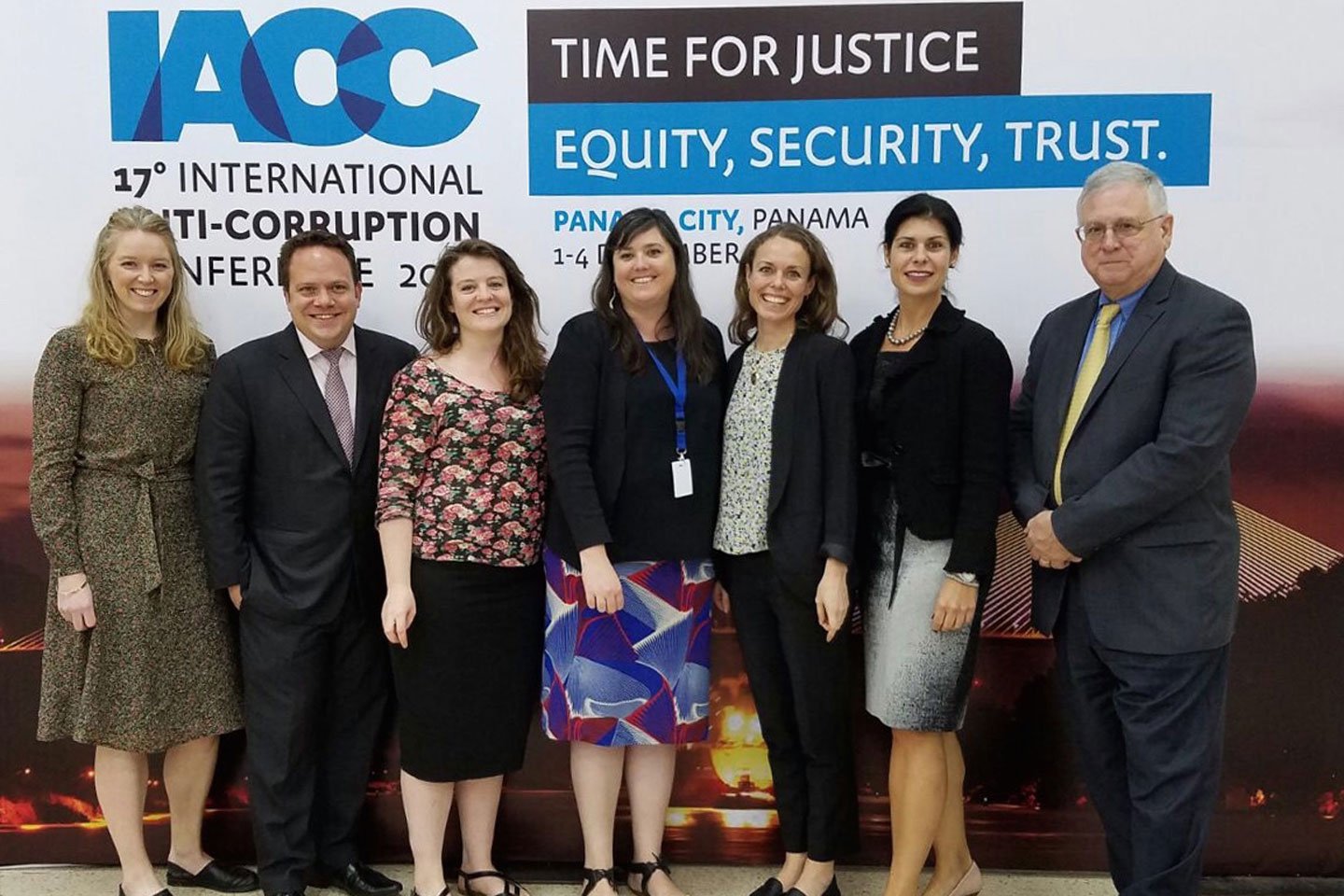Why business leadership on beneficial ownership transparency is critical in 2017

B Team staff with EITI and business leaders from Bank of Montreal, Deloitte, and Thomson Reuters
2016 has been a landmark year for beneficial ownership transparency. Beginning with the Panama Papers leak, which placed a much needed global spotlight on the role of anonymous companies in facilitating crime, tax evasion, and fraud, and providing the safety of opacity for the corrupt financial deals of politicians, we have since seen a year of tremendous progress.
More than 10 governments (including Argentina, Colombia, Italy, Mexico, Nigeria, Afghanistan, France, Kenya, Nigeria and UK) have committed to implementing public registers of beneficial ownership information and the UK beneficial ownership register went live in July 2016.
The burgeoning norm of corporate transparency does not start and end with the public sector. This is where the B Team comes in – we have a track record of working with business and civil society to achieve progress on beneficial ownership transparency and to increase the accountability, transparency and responsiveness of both companies and governments to citizens. We do this not just because it’s better for the world, but also because it’s better for business.
The importance of publicly available beneficial ownership information to enabling a cleaner business operating and investment environment, allowing companies to know who they are doing business with, is clear. Both business and investors are now actively championing the business case for ownership transparency. For instance, at the UK Anti-Corruption Summit held in May 2016, B Team Leader companies Natura Cosmeticos and Unilever published their ownership structures as open data and are encouraging other businesses to join them.
The 17th International Anti-Corruption Conference (IACC) in Panama was a fitting place to launch and discuss two exciting new ways for businesses to join the ownership transparency movement:
- OwnershipTransparency.com
OwnershipTransparency.com is a practical guidance tool for business to take action to end anonymous companies and improve ownership transparency within their businesses and through their supply chains. Jointly developed by The B Team, Deloitte, Bank of Montreal and Thomson Reuters, this website is the first of its kind, helping business to position themselves as leaders in ownership transparency, build stronger trust with investors, strengthen supply chain due diligence, foster public trust and grow their license to operate. We know that business leadership and business champions are critical in helping drive national and global policy and responding to threats against beneficial ownership transparency, made by those who stand to gain from opacity. We are urging business leaders to visit OwnershipTransparency.com and commit to the six actions. - Open Ownership – The Global Beneficial Ownership Register
Open Ownership is building the world’s first open register of global beneficial ownership in the public interest - mapping who controls and benefits from companies. The register is being created by a consortium of leading transparency and anti-corruption organisations, and will enable governments to crack down on crime, allow companies to verify who they are really doing business with and empower civil society to investigate and campaign against injustice.
The IACC in Panama was an opportunity to promote the platform and gather critical feedback through a series of workshops from anti-corruption experts, policy specialists, academics and business. Open Ownership is now recognised by the anti-corruption movement not only as a tool for governments, investigators, and civil society, but also as a way to drive a cleaner, more effective and efficient business environment.
To ensure that Open Ownership is a world class global register that meets business needs as one of the key users of beneficial ownership data, a Private Sector Advisory Group has been established and convened its first meeting late last month. The group includes BHP Billiton, Bank of Montreal, Hikma Pharmaceuticals and others who will provide input into the private beta and development of Open Ownership. This will ensure it is a user focused tool that makes it easier for companies to know who they’re doing business with, supports due diligence processes and reduces risk for business when they are creating new client and supplier relationships.
Looking ahead, 2017 presents myriad challenges and opportunities for the ownership transparency movement. In late 2016, transparency amendments to the EU Anti-Money Laundering Directive were dropped from the legislation and firm commitments made by the EU in the wake of the Panama Papers leak are being undermined. In the US, despite bipartisan and growing business support for the proposed bill in US House and Senate requiring the US Treasury Department and states to collect, maintain, and update beneficial ownership information on legal entities for law enforcement purposes, this progress could be under threat by the incoming administration.
Business support can turn the tide on these backward steps. Secrecy benefits a few at the expense of the many, poisoning the environment for business and enabling an array of unethical behaviour. Only with the deep involvement of the private sector in making the case for it will transparency become the norm. We are calling on all businesses to join us in ensuring that the progress we made towards increased transparency in 2016 is not lost.
Are you a business that wants to help build a tool that will give you true clarity on who you’re doing business with? There are many ways to contribute. Visit OwnershipTransparency.com & OpenOwnership.org to take action or contact Madeleine McCarroll direct.
About The B Team
The B Team is a group of global leaders focused on transforming the role of business to promote social and environmental well-being, alongside the economic contributions of business. Leaders include sitting CEOs such as Paul Polman and Bob Collymore, self-made entrepreneurs such as Richard Branson and Guilherme Leal, and global leaders such as Sharan Burrow head of the Global Trade Union, and Ngozi Okonjo-Iwaela, previous Finance Minister of Nigeria. Together, the leaders engage in advocacy, inspire companies to lead by example and help promote systemic solutions.
Publication type
Blog post